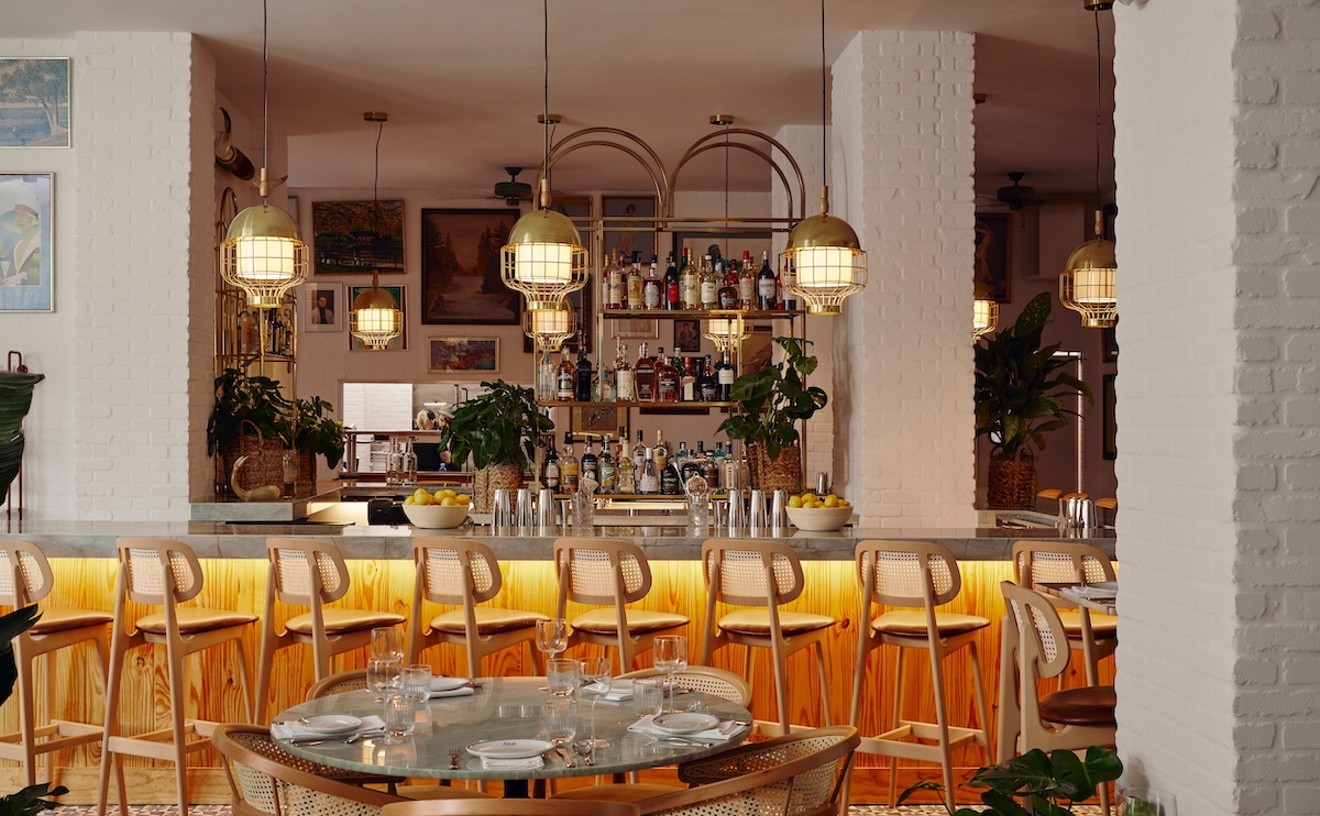I just recently noticed that Fifty Restaurant on Miami Beach's Ocean Drive, home of chef Roly Cruz-Taura's progressive American cuisine, is now 444 Ocean. As evidenced by the menu, it appears to have downgraded into another of that street's many meccas of mediocrity. But enough naysaying. Local food commentary, mine included, has lately been focused on the negative — specifically the spate of recent high-profile restaurant closings. So I am pleased to report a positive trend taking root: the emergence of fun, funky neighborhood dining establishments — such as Soya y Pomodoro, Con Tutto, and Café 190 — whose no-name chefs produce good food at good prices in a good-vibe environment. Add the Brazilian Boteco and Haitian Le Petit Resto to the list.
Ed Lozama, director of WSRF 1580 AM, opened Le Petit Resto just over the North Miami Beach line in April 2006. Wyclef Jean, Jimmy Jean-Louis, and other notable Haitian entertainers and politicians have paid visits to the restaurant, and the local Haitian-American community has made Petit its home away from home. Gabriela Hyppolite took over the property June 1, and chef Markens Isidor's clean, vibrantly rendered island cuisine has made it more of a draw than ever.
Paintings on loan from the Haitian Galerie Nader hang slightly askew on deep-orange walls in the snug 46-seat space. On Friday evenings a well-heeled crowd packs in and Le Petit Resto transforms into a celebratory poetry reading/musical performance venue. We felt like we were at a party in Haiti — or, since I've never been, what I imagine being at a party in Haiti would be like. One needn't speak French or Kreyol to feel the heat and passion of the recitals, which were effectively counterpointed by soft, jazzy guitar riffs in the background; the same trio of guitarists jammed between poems. The room was electric with joy.
The cuisine is plugged in, too. Truth be told, I was sold on Isidor's skills upon first laying eyes on the predinner salad — a platter of perky green mache leaves lightly misted with vinaigrette and festooned with meticulously julienned tomatoes and multicolor peppers so neat and bright they looked like strips of candy. I knew then there was something special about this place.
The rest of the fare was just as fresh and fine. A whole red snapper dazzled with spicily seared skin and juicy white flesh. Grilled conch (lambi) was imbued with smoke and drizzled with a crystallizing dash of reduced balsamic vinegar. Goat stewed in spicy brown gravy gratified, too, as did fried chunks of turkey (tassot dinde) and tender cubes of fried pork (griot) capped with crisped fat (like meatier Cuban chicharrones) that respectively anchored a pair of fritay platters. Plantains, soupy red beans and rice, and vegetable of the day accompany the fish dishes; fried disks of plantain and sweet potato fill the fritay plates, along with acra fritters that taste like piquant potato croquettes. Entrées range in price from $7 to $22.
The aforementioned dishes are culled from the "old" menu; Resto's staff has been perpetually touting a new bill of fare, which servers accidentally handed out to us on our first two visits. The traditional plates will still be available, as well as seared red snapper with lemongrass sauce and tropical fruit salsa, pasta dishes, and other contemporary offerings. A third trip, a month later, revealed that the new menu was still not in effect, but by the time you read this, it might be. Or not.
This restaurant is as erratically run as any you're likely to encounter. Numerous items requested from the menu were unavailable, and though the cuisine we did get was consistently cooked just right, it took the kitchen crew quite awhile to achieve the feat. Service, too, is of an amiable but ambling nature. In short: You will likely wait some time before you see any food in front of you. But you'll love this place nonetheless. After the meal, a mini martini glass of rum-spiked fruit cocktail is served — a small gesture, but also a refreshingly hospitable one that exemplifies what Le Petit Resto is all about.
The same warmth and congeniality are extended at Boteco, as is the haphazardness of service. To be fair, this Brazilian hot spot is very new — in operation only two weeks when we first took our seats at a picnic table in the spacious, lawn-covered grounds behind the 79th Street quarters. There's also an outdoor patio in front, with crowded tables and a busy bar crammed beneath a bamboo roof. A bigger, bulkier bar — above which are suspended framed mirrors with wines, beers, cocktail specials, and menu items scrawled upon them — braces the front of the indoor room. With live Brazilian music bouncing through the air, Boteco felt like party time at a Brazilian boteco (like a brasserie) — or, since I've never been, what I imagine party time at a Brazilian boteco would feel like.
After 45 minutes, when there was still no food in sight, our conversation began to degrade from reflections on how cool the setting was to primal grunts of hunger. We flagged down a waiter and asked whether some bread could be brought while we lingered. He assured us it could indeed. We nursed our beers, not sure of when we'd be able to get more — it was an extremely long wait for the first round (and luckily one of us had a bottle opener on hand, because the waiter did not). Brews, $3 to $4, include Peroni, Brahma, and the Brazilian Novaskin. Wines — just a few on hand — are $5 per glass, as are textbook caipirinhas. Food, too, is a bargain, all offerings running $6 to $13.
An amicable manager came over to explain the delay was due to computer difficulties, the kitchen evidently not receiving orders punched in by the staff. Servers were sympathetic and remained pleasant throughout. At some point we were offered complimentary bowls of black bean broth, and about 20 minutes later our plates appeared. A return engagement a couple of weeks later proved faster and smoother, although when Boteco gets busy, which is just about always, waiters still tend to get overwhelmed.
The menu comprises just a dozen petisco de botecos (appetizers) and eight porções (sides). Winners among the former were a half-dozen balls of creamy bacalao croquettes; yummy yuca-beef croquettes; and a six-pack of pastry turnovers stuffed with beef, shrimp, and hearts of palm. Chicken croquettes were doughy and nearly devoid of chicken, so poultry purists should pick instead frango a passarinho, hacked pieces of chicken, some on the bone, some not, all fried and tastily tossed with garlic and parsley.
We didn't care for the blandly sautéed shrimp and ended up giving most of them away to a few skinny kittens who had wandered into the yard. Picanha fatiada na chapa, which translates to "grilled sirloin steak," is the most entréelike serving, but was overcooked to the consistency of jerky. "Shredded jerk beef," on the other hand, turned out to be softly braised morsels of meat simmering with mashed yuca and melted Catupiry cheese — which would have been ideal to sop up with rolls, but it was only after we had finished the last morsel of the last dish that the waiter returned, apologetically, with our basket of bread. The buns inside were steamy-hot, quite heavy, and very tasty, but we were no longer hungry enough to indulge. Nor were we the least bit upset about this, because Boteco, like Le Petit Resto, possesses a near-magical knack for making diners happy. Happy people, it should be noted, are forgiving people.











